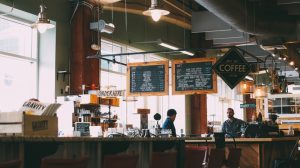When traveling for business, you want space: space for your laptop, space for your phone, space to work, and a place to possibly even hold a meeting. But where can you find all this in order to stay productive?
Look no further than Spacious, a solution to “space” when working outside the office. Spacious turns restaurant dining areas into workspaces when they’re not actually open for business. The service has grown to nearly 20 locations since its debut just two years ago.
According to a recent article in USA Today, Emily Merrell, founder of Six Degrees Society joined Spacious last September. In less than a year, Merrell was so impressed by Spacious, she began using various locations for her office. In fact, when she recently moved to San Francisco, Merrell continued to use Spacious to run Six Degrees, an organization she created and which organizes networking events for women.
“I like the flexibility and that I can go to many locations,” she says. “In New York, I literally will go to the Upper West Side, the Upper East Side and Brooklyn, to three or four spaces in a day.”
“Digital nomads” are professionals who favor “co-working” spaces over traditional offices, and look for places with free wifi, a power source, and maybe something to eat and drink. Digital nomads often work for themselves or companies that offer remote situations. Startups that can’t afford to lease an office just yet are another group that benefits from such an arrangement.
 While using your local coffee shop for an office has been the norm for some time, more establishments are becoming more tech-savvy and sophisticated as a way to entice digital nomads and give them a place to stay productive. In fact, the idea has gone nationwide and is steadily spreading all over the world.
While using your local coffee shop for an office has been the norm for some time, more establishments are becoming more tech-savvy and sophisticated as a way to entice digital nomads and give them a place to stay productive. In fact, the idea has gone nationwide and is steadily spreading all over the world.
Co-founder and CEO of Spacious, Preston Pesek, told USA Today: “People are increasingly wanting to work outside of a traditional office environment. If you think about the way the job market has evolved for the last two decades, no one has a job with the same company for 30 years anymore. The career people are constantly retooling their skills and transitioning.”
What was once used solely by freelancers, consultants, and artists — free wifi and coveted outlets to keep the juices flowing — coffee shops and restaurants are now looking at the design of these spaces to better serve the public. No longer are there fights for spaces near electrical outlets. And wifi is not only free, it’s capable of handling all sorts of devices. (Just, you know, don’t waste everyone else’s bandwidth by watching Netflix.)
Companies like Spacious and KettleSpace are growing by encouraging non-lunch-serving restaurants to turn their empty rooms into workspace during the day. No longer waiting for dinner crowds, these rooms have the necessities, like tables and chairs and available wifi. It’s a way business travelers can stay productive and maybe grab a bite to eat when the restaurants start serving food again.
Using their own staff as hosts to ensure client comfort (i.e. water and coffee), restaurant owners can allow clients to bring in guests for meetings, sometimes for an additional fee. Food may also be available, depending upon the location. Finally, meeting holders and attendees often stay for happy hour and dinner which means additional income for the restaurant owners.
“People are more mobile than ever before, and traditional co-working (spaces) are really expensive,” says Andrew Levy, co-founder of KettleSpace. “At the same time coffee shops are crowded, and there are beautiful restaurants all over that are sitting underutilized.”
Not to be outdone by restaurants and office buildings, hotels are jumping on the bandwagon, too.
Already offering lodging food and beverages, dedicated meeting space was a simple addition. They market to guests as well as locals. Selina, a Latin American hotel chain is opening a South Beach, Miami location where guests can get dedicated workspace offering amenities such as higher speed wifi, a printer, desks, meeting spaces and a kitchen.
Shelby Albo, a travel and fitness expert who hails from New Jersey, uses KettleSpace in between meetings and workouts approves.
“So many companies are allowing employees to work from home now,” she said. “KettleSpace gives us the environment where we can work but also have social moments and a community aspect.”
How do you stay productive when you’re on the road? Do you find a coffee shop, hit a co-working space, or do you use a service like Spacious? Share your stories and favorite work spots on our Facebook page, or on our Twitter stream.
Photo credit: PxHere (Creative Commons 0)
